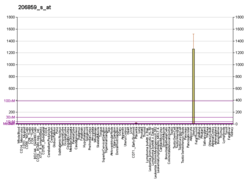PAEP
Glycodelin also known as progestagen-associated endometrial protein (PAEP) or pregnancy-associated endometrial alpha-2 globulin is a protein that in humans is encoded by the PAEP gene.[3][4][5]
Function
This gene is a member of the kernel lipocalin superfamily whose members share relatively low sequence similarity but have highly conserved exon/intron structure and three-dimensional protein folding. Most lipocalins are clustered on the long arm of chromosome 9. The encoded glycoprotein has been previously referred to as pregnancy-associated endometrial alpha-2-globulin, placental protein 14, and glycodelin, but has been officially named progestogen-associated endometrial protein. Three distinct forms, with identical protein backbones but different glycosylation profiles, are found in amniotic fluid, follicular fluid and seminal plasma of the reproductive system. These glycoproteins have distinct and essential roles in regulating a uterine environment suitable for pregnancy and in the timing and occurrence of the appropriate sequence of events in the fertilization process. A number of alternatively spliced transcript variants have been observed at this locus, but the full-length nature of only two, each encoding the same protein, has been determined.[5]
References
- 1 2 3 GRCh38: Ensembl release 89: ENSG00000122133 - Ensembl, May 2017
- ↑ "Human PubMed Reference:".
- ↑ Rutanen EM, Koistinen R, Seppälä M, Julkunen M, Suikkari AM, Huhtala ML (Feb 1988). "Progesterone-associated proteins PP12 and PP14 in the human endometrium". Journal of Steroid Biochemistry. 27 (1-3): 25–31. PMID 3320533. doi:10.1016/0022-4731(87)90290-1.
- ↑ Van Cong N, Vaisse C, Gross MS, Slim R, Milgrom E, Bernheim A (Mar 1991). "The human placental protein 14 (PP14) gene is localized on chromosome 9q34". Human Genetics. 86 (5): 515–8. PMID 2016092. doi:10.1007/bf00194645.
- 1 2 "Entrez Gene: PAEP progestogen-associated endometrial protein (placental protein 14, pregnancy-associated endometrial alpha-2-globulin, alpha uterine protein)".
Further reading
- Seppälä M, Bohn H, Tatarinov Y (1998). "Glycodelins". Tumour Biology. 19 (3): 213–20. PMID 9591048. doi:10.1159/000030009.
- Salier JP (Oct 2000). "Chromosomal location, exon/intron organization and evolution of lipocalin genes". Biochimica et Biophysica Acta. 1482 (1-2): 25–34. PMID 11058744. doi:10.1016/S0167-4838(00)00144-8.
- Halttunen M, Kämäräinen M, Koistinen H (Oct 2000). "Glycodelin: a reproduction-related lipocalin". Biochimica et Biophysica Acta. 1482 (1-2): 149–56. PMID 11058757. doi:10.1016/S0167-4838(00)00158-8.
- Seppälä M, Taylor RN, Koistinen H, Koistinen R, Milgrom E (Aug 2002). "Glycodelin: a major lipocalin protein of the reproductive axis with diverse actions in cell recognition and differentiation". Endocrine Reviews. 23 (4): 401–30. PMID 12202458. doi:10.1210/er.2001-0026.
- Seppälä M, Koistinen H, Koistinen R, Chiu PC, Yeung WS (2007). "Glycosylation related actions of glycodelin: gamete, cumulus cell, immune cell and clinical associations". Human Reproduction Update. 13 (3): 275–87. PMID 17329396. doi:10.1093/humupd/dmm004.
- Garde J, Bell SC, Eperon IC (Mar 1991). "Multiple forms of mRNA encoding human pregnancy-associated endometrial alpha 2-globulin, a beta-lactoglobulin homologue". Proceedings of the National Academy of Sciences of the United States of America. 88 (6): 2456–60. PMC 51251
 . PMID 2006183. doi:10.1073/pnas.88.6.2456.
. PMID 2006183. doi:10.1073/pnas.88.6.2456. - Wood PL, Iffland CA, Allen E, Bentick B, Burton P, Shaw RW, Bell SC (May 1990). "Serum levels of pregnancy-associated endometrial alpha 2-globulin (alpha 2-PEG), a glycosylated beta-lactoglobulin homologue, in successful and unsuccessful assisted conception". Human Reproduction. 5 (4): 421–6. PMID 2113930.
- Vaisse C, Atger M, Potier B, Milgrom E (1990). "Human placental protein 14 gene: sequence and characterization of a short duplication". DNA and Cell Biology. 9 (6): 401–13. PMID 2206398. doi:10.1089/dna.1990.9.401.
- Check JH, Nowroozi K, Chase JS, Vaze M, Joshi S, Baker AF (Jun 1990). "Serum progestagen-associated endometrial protein (PEP) levels in conception versus nonconception cycles following in vitro fertilization-embryo transfer". Journal of in Vitro Fertilization and Embryo Transfer. 7 (3): 134–6. PMID 2380618. doi:10.1007/BF01135675.
- Wood PL, Waites GT, MacVicar J, Davidson AC, Walker RA, Bell SC (Dec 1988). "Immunohistological localization of pregnancy-associated endometrial alpha 2-globulin (alpha 2-PEG) in endometrial adenocarcinoma and effect of medroxyprogesterone acetate". British Journal of Obstetrics and Gynaecology. 95 (12): 1292–8. PMID 2975952. doi:10.1111/j.1471-0528.1988.tb06820.x.
- Joshi SG (1988). "Progestin-dependent human endometrial protein: a marker for monitoring human endometrial function". Advances in Experimental Medicine and Biology. 230: 167–86. PMID 3135704. doi:10.1007/978-1-4684-1297-0_10.
- Julkunen M, Seppälä M, Jänne OA (Dec 1988). "Complete amino acid sequence of human placental protein 14: a progesterone-regulated uterine protein homologous to beta-lactoglobulins". Proceedings of the National Academy of Sciences of the United States of America. 85 (23): 8845–9. PMC 282603
 . PMID 3194393. doi:10.1073/pnas.85.23.8845.
. PMID 3194393. doi:10.1073/pnas.85.23.8845. - Huhtala ML, Seppälä M, Närvänen A, Palomäki P, Julkunen M, Bohn H (Jun 1987). "Amino acid sequence homology between human placental protein 14 and beta-lactoglobulins from various species". Endocrinology. 120 (6): 2620–2. PMID 3569148. doi:10.1210/endo-120-6-2620.
- Bell SC, Keyte JW, Waites GT (Nov 1987). "Pregnancy-associated endometrial alpha 2-globulin, the major secretory protein of the luteal phase and first trimester pregnancy endometrium, is not glycosylated prolactin but related to beta-lactoglobulins". The Journal of Clinical Endocrinology and Metabolism. 65 (5): 1067–71. PMID 3667877. doi:10.1210/jcem-65-5-1067.
- Bell SC, Hales MW, Patel SR, Kirwan PH, Drife JO, Milford-Ward A (Sep 1986). "Amniotic fluid concentrations of secreted pregnancy-associated endometrial alpha 1- and alpha 2-globulins (alpha 1- and alpha 2-PEG)". British Journal of Obstetrics and Gynaecology. 93 (9): 909–15. PMID 3768286. doi:10.1111/j.1471-0528.1986.tb08007.x.
- Joshi SG, Smith RA, Stokes DK (Nov 1980). "A progestagen-dependent endometrial protein in human amniotic fluid". Journal of Reproduction and Fertility. 60 (2): 317–21. PMID 6776278. doi:10.1530/jrf.0.0600317.
- Horne CH, Paterson WF, Sutcliffe RG (Jul 1982). "Localization of alpha-uterine protein in human endometrium". Journal of Reproduction and Fertility. 65 (2): 447–50. PMID 7047733. doi:10.1530/jrf.0.0650447.


